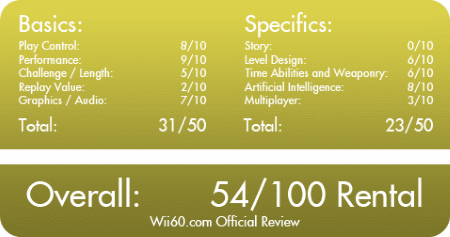Let’s Talk Games Writing: Review Scores
 A long time ago, in a university far, far away, I came to the conclusion that review scores were a plague upon games writing. They were just one of many problems with the industry, and I would fix it with proper, well-written reviews that would encourage a reader to properly soak up the analysis in its entirety.
A long time ago, in a university far, far away, I came to the conclusion that review scores were a plague upon games writing. They were just one of many problems with the industry, and I would fix it with proper, well-written reviews that would encourage a reader to properly soak up the analysis in its entirety.
When I began writing for Wii60.com, I found myself in a debate on whether we should have scores or not. Rather than do a proper compromise, we fused our ideas together into a complex mess. Each game would be scored on five concepts shared between all games, and then scored on five categories based around more specific categories that only certain types of games shared. All of these items would then be added up together, and based on that score it would receive a verbal rating declaring it excellent, good, a rental, poor, or atrocious.

Yes, because what review scores needed were more metrics.
After I left Wii60.com and began my own personal blog, originally with the intent of being a larger gaming website focused on in-depth analyses and discussion, I ditched the score aspect and just went with the verbal assessment. It was similar to a five-star rating, but communicated the idea clearly. Was the game worth playing? Was it worth playing and owning?

Simple, but still rather subjective
My blog has changed drastically since those days, and so has my outlook on review scores. That is to say, I no longer have a set opinion on scoring a game. There are simply too many factors to consider, all of which I have tackled in some way without even realizing it.
The first thing to consider is what the purpose of the review score is, or to what purpose it serves. For the type of writing I prefer, one that latches onto specific ideas and analyzes their effectiveness, I’d rather not latch a grade onto. That implies, to me at least, that you can grade an experience. While I believe you can boil much of this material down in an objective manner, to attach the score removes any and all sense of subjectivity, which is part of what makes art what it is.
That is just my writing style, however, and my purpose is to get people thinking a little bit more deeply about what they’re playing, or to shine a light onto certain elements of a game and explain why it may or may not be so effective in its execution. Let’s take my analysis of Destiny as an example. It’s very much a study on Bungie’s philosophy and very much praises the execution of their goal, but does it really suggest that the game is good in a traditional sense?
No, because the traditional review is intended to be consumer advice. The idea behind your average review is to determine whether it is a product worth buying or not. That’s the intent, right?
 Has that always been the purpose of a review for a multimedia product? When considering the five-star system often used for film, does it assess the likelihood that the audience will enjoy it or a more critical evaluation of the film’s quality? Considering how poorly the Transformers films tend to score versus how successful they tend to be financially, I’d imagine that the score is not at all intended for the general audience, which means film reviews, at the very least, are rarely consumer advice. This is likely where the typical attitude of “I never agree with film critics” comes from, or at least did in a time before the Internet.
Has that always been the purpose of a review for a multimedia product? When considering the five-star system often used for film, does it assess the likelihood that the audience will enjoy it or a more critical evaluation of the film’s quality? Considering how poorly the Transformers films tend to score versus how successful they tend to be financially, I’d imagine that the score is not at all intended for the general audience, which means film reviews, at the very least, are rarely consumer advice. This is likely where the typical attitude of “I never agree with film critics” comes from, or at least did in a time before the Internet.
Then again, I’ve had plenty of friends that have stated the same thing when it comes to game reviews. So does that mean game reviews are not consumer advice?
I believe game reviews are a product of imitation that would later become a habit. We reviewed games because that’s simply what you do when you’re writing about a medium of entertainment. There are reviews for books, film, and music, so why not games as well? Games have a very fragmented history, though. Many came into games when they were more simplistic arcade games. Others came in when they were becoming narratively complex puzzle and adventure games on the computer. At the same time, many players were being raised on the early days of Nintendo, an evolution of the more arcade style of games. Suddenly there are a variety of players with different expectations of what makes a good game. As the industry begins to grow, adapt and evolve to new technologies, looking almost completely different at the end of the decade as it had at the start, there will be players beginning to write about these titles with a variety of different backgrounds and concepts of what quality truly is.
The real question to ask is, what were their credentials? This is a question I still ask now of our writers. Be it in writing capability, piecing together a proper argument or actual knowledge of game design, I find many games writers are not up to the task of properly critiquing modern games. The constant demand that games grow up is ironic to me, as our medium has reached a point where it demands more mature, more knowledgeable and more skilled writers than what’s available.
 I digress, however. No matter the capability of the writers, it does not answer what purpose our scores should serve. If they are to be consumer advice, then how does one account for taste? It is possible to approach subjective products and ideas from an objective perspective, but at the end of the day you must keep in mind that certain people are drawn to certain and often vague things.
I digress, however. No matter the capability of the writers, it does not answer what purpose our scores should serve. If they are to be consumer advice, then how does one account for taste? It is possible to approach subjective products and ideas from an objective perspective, but at the end of the day you must keep in mind that certain people are drawn to certain and often vague things.
Let’s take the recent The Order: 1886 as an example. If a review is consumer advice, then the score should reflect the chances that the player will enjoy the game or not. Chances that what sort of player will enjoy it, though? Chances that a fan of shooters will enjoy it? If so, what kind of shooter fans? Those that enjoy games like Rainbow Six or those that enjoy Doom?
If we decide to ignore all of that and decide the score represents quality, then it’s not just a matter of the writer’s credentials. You start to bring that element that reviewers are not trustworthy back in. Consumers saying that they never agree with a game’s score, or don’t agree with reviewers.
I suppose I sound as if I’m against review scores. In truth, I’m not. I think they can be useful for niche communities or gaming sites where everyone has certain elements of taste in common. Determining the odds that fans of grand strategy gaming will enjoy a certain title on a website dedicated to the genre is actually plausible and a useful shorthand tool. You can trust that someone writing for a website dedicated to grand strategy games is going to be able to speak for that website’s intended audience.
Would a reviewer whose preferred genre is adventure games be able to properly assess the quality of a racing game, though? That’s where things get a bit iffy.
I do not have an answer or solution to the matter of review scores. I do not know what larger publications should try or rely on. What is clear to me is that the problems of the review score are the same as those of the review. How reliable is the text and evaluation in regards to the audience? What are the chances that the product is worth buying for the reader?
It’s not always a simple thing to consider, but it is one worth considering if you’re going to be running and writing for a website that implements such things.


